Lindley Mills Organic Flours
All of Lindley Mills' organic flours are certified by Oregon Tilth and Kosher products are certified by OK Labs. We are BRC (British Retail Consortium) and Global Food Safety Certified. All certified organic grains are non-GMO. We are also supporters and members of the Bread Baker's Guild of America.
As part of our ongoing commitment to support local farmers, we have been working with several North Carolina organic wheat farmers to grow hard red winter wheat varieties bred to adapt to North Carolina's climate. The 100% organic hard red winter wheat variety has produced the yields that farmers look for as well as the protein quality that professional bakers desire.
What is 100% Certified Organic?
It is a certification system whose goal is to ensure that we build up our soils naturally, through crop rotations and other practices, to make our farms sustainable and not dependent on synthetic chemical inputs resulting in safer, healthier foods and environmental systems.
What is the difference between conventional and organic?
It is the quality of the growing practices and the post harvest milling and storage. Organics can be traced from the field to the plate.
Are organics more nutritious than conventional?
The testable nutritional differences are negligible. It is the growing, milling, and storage practices that distinguish organic from conventional.
Why do people buy organics?
Because the grains, fruits, and vegetables were grown without the use of synthetic pesticides, herbicides, genetically engineered seed, and sewage sludge.
Because the animals providing the meat and dairy were not routinely administered synthetic growth hormones and antibiotics.
Organic consumers believe that these toxic chemicals could have a long term detrimental effect on their health.
Organic farming systems’ sustainability helps build increased resilience and security in our nation’s food supply.

Certified Organic Flour
We are proud to provide 100% Certified Organic flours to large and small bakeries, restaraunts, and distributors across the United States as well as to our neighbors right here in the Carolinas. Our Kosher products are Certified Kosher by OK Kosher and we hold Global Food Safety certifications from the BRC to ensure the highest possible quality product for each customer.
Fresh Milled to Order
We fresh mill each of our products to order with a small amount of overrun for local pickups. (For more info on retail purchasing at the Mill please visit our home baker and retail order page here.) We also do custom blends at volume and can consult on your next innovative baking project.
Product List
Below is a list of many of our products, but it is not exhaustive. If there is a specific flour you are looking for please let us know and we will be glad to find a good fit.
For more information about our products or working with us please call 336-376-6190 or send an email with your name, phone number, and inquiry to This email address is being protected from spambots. You need JavaScript enabled to view it..
White Flours
Pastry
All-Purpose
Bread
Malted X
White with Germ
Hi Extraction
14% (Hi Gluten)
Cake Flour
North Carolina Wheat Bread Flour
Wheat Flours
Whole Wheat Bread
Whole Wheat Pastry
White Whole Wheat
Cracked Wheat
Wheat Bran
Super Sprout™ Sprouted Flours
Super Sprout™ Sprouted Whole Grain Wheat Flour
Super Sprout™ Spelt
Super Sprout™ Ancient Grains (Amaranth, Quinoa, Buckwheat, Sorghum, Millet)
Super Sprout™ Bread Blend
Rye Flours
Light Rye
Whole Rye
Dark Rye
Rye Chops
Rye Meal
Spelt Flour
Whole Spelt
Yellow Corn
Yellow Corn Meal
Yellow Corn Grits (Stoneground, Old-Fashioned)
Why Sprouted Wheat?
We use a proprietary process to sprout our organic whole grain wheat and make Super Sprout™ Sprouted Whole Grain Wheat Flour. This process greatly enhances the wheat's nutrition and digestibility, allowing the body to digest it more like a vegetable than a grain. Eating Super Sprout™sprouted whole grain wheat flour will "jump-start" your digestive process and provide far superior nutritional value for your body compared to other flours.
You can substitute Super Sprout™ Sprouted Whole Grain Wheat Flour for white or whole wheat flour in any recipe to bake healthier, sprouted whole wheat treats!
Health Benefits of Sprouted Grains
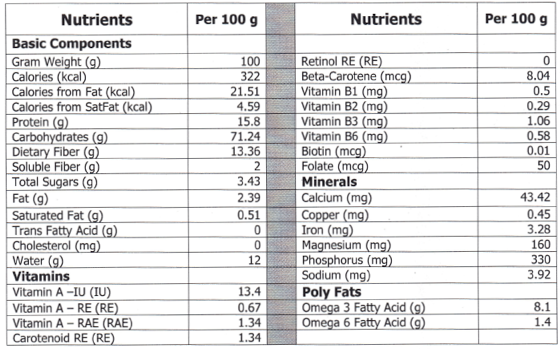
Scientific studies have shown that the sprouting of grains causes an increase in enzyme activity, an increase in total proteins, changes in amino acid composition, measurable increases in soluble fiber, a decrease in starch, and slightly higher amounts of some minerals and vitamins including Beta Carotene, Folic Acid, Iron, Omega 6 fatty acids, Omega 3 fatty acids, B and D Vitamins, Niacin, Calcium, and Vitamin E.
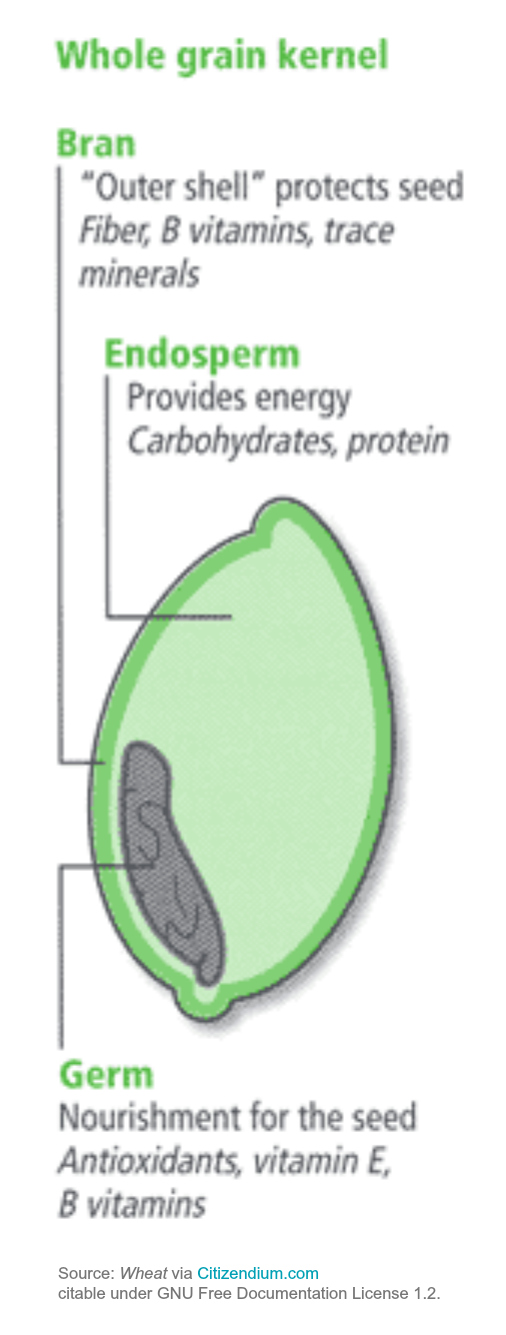 In all parts of the world, and especially in developing countries, plant-based foods are the main dietary staple. However, these plant-based diets often have deficits of certain micronutrients like Calcium, Iron, and Zinc.
In all parts of the world, and especially in developing countries, plant-based foods are the main dietary staple. However, these plant-based diets often have deficits of certain micronutrients like Calcium, Iron, and Zinc.
These micronutrients and others are present in the bran layers and germ of wheat, but are sequestered and not bioavailable due to the high Phytic Acid content of wheat.
Humans lack the enzyme phytase in their digestive tract, and are unable to reduce the phytic acid and capture these micronutrients, diminishing the nutritional value of grain-based foods.
Our proprietary process enhances the wheat and gives Super Sprout™ lower amounts of phytic acid than other flours, allowing the body access to all of the nutrients that the wheat has to offer.
Nutrition Awakened
Super Sprout™ Sprouted Whole Grain Wheat Flour is the "awakened" (sprouted) wheat seed that has been milled into a high quality baking flour.
Instead of just eating flour from the dormant wheat, Super Sprout™ takes advantage of the live sprouted wheat grain. It jump-starts the seed's germination process and results in reduced Phytic Acid, as well as the release of a wealth of beneficial, bioavailable micronutrients.
Finely Ground for Enhanced Nutrition
Super Sprout™'s superfine particle size is important for several reasons. Wheat bran, for instance, when finely ground shows increasing water-holding capacity and soluble dietary fiber, improving its nutritional potential. Smaller particles greatly increase surface area absorption and help the flour take up more water and increase baking yields. The superfine particle size helps with digestibility and can create a smooth dough with strong gluten bonds even when hydrated at 80% or more.
Super Sprout™ absorbs 20%-30% more water than other whole wheat flours.
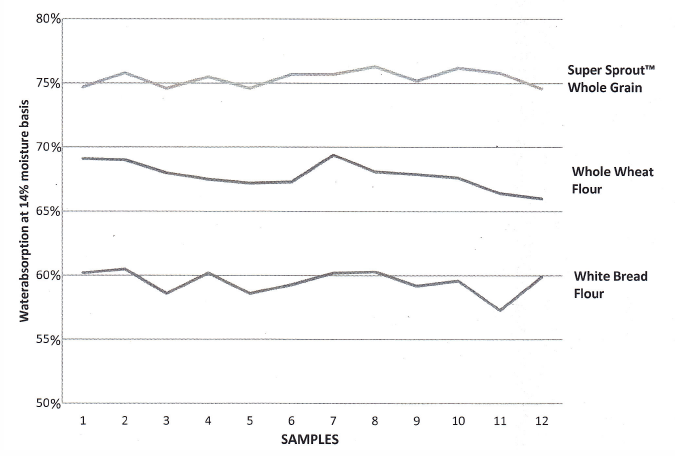
Learn more about the Super Sprout™ difference here.
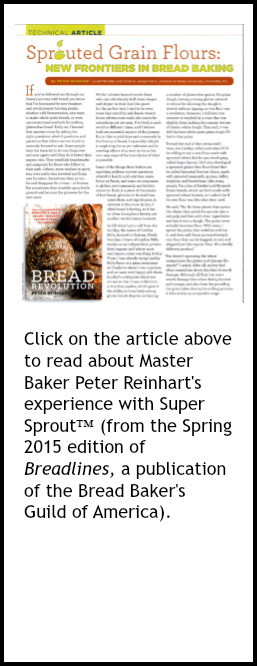
Is Super Sprout™ sprouted whole grain wheat flour just "whole wheat flour"? How can the consumer/baker tell the difference?
You cannot mistake Super Sprout™ sprouted whole grain wheat flour for regular whole wheat flour. Super Sprout™ has:
- A different look – a uniform creamy color
- A different feel — very soft and silky fine
- A different taste — well rounded, clean wheat taste (not bitter)
- Better nutrition — micro-nutrients are enhanced and more bioavailable due to the sprouting process
- Better nutrition — products ingest and digest easily due to the sprouting process
- Different performance — performs best at higher hydrations of 85 - 95% and has already accomplished the desired goals of a prefermentation step
- Different baked product – more golden brown due to an increase in carmelized sugars
- Different baked product – products are softer and stay fresh longer, naturally
How do I substitute Super Sprout™ with other flour?
Use Super Sprout™ in all your recipes as a substitute for wheat flour–whole wheat or refined white. Simply substitute with a 1:1 ratio and add 10% to 20% more water than your recipe calls for.
What are the nutritional benefits of Super Sprout™ over other whole wheat flours?
- Sprouting greatly enhances the nutrition and digestibility of wheat. The body handles sprouted wheat similarly to the way it would intake and digest a vegetable. Our unique, proprietary process for sprouting Super Sprout™ jump-starts digestion and provides a far superior nutritional value for your body compared to other flours, making it a preferred option for health-conscious home and artisan bakers, including individuals with non-celiac gluten sensitivity, diabetes, and gastrointestinal issues. Nutrition Analysis has shown that Super Sprout™ has:
↑ Soluble fiber
↑ Beta Carotene
↑ Folic Acid
↑ Iron
↑ Omega 6 fatty acids
↑ Omega 3 fatty acids
↑ B and D Vitamins
↑ Niacin
↑ Calcium
↑ Vitamin E
↓ Sodium
↓ Phytic Acid
Is Super Sprout™ organic and also non-gmo?
Absolutely! At Lindley Mills, we take pride in providing 100% organic, non-GMO flour to our customers just like our founder, Thomas Lindley did in 1755. We believe that organics are safer, healthier, and more sustainable. We are transparent about our products, labeling, and business practices because our customers want to know—and deserve to know—where their food comes from, and what's in their food. We believe that every consumer has the right to make an informed choice based on that knowledge. Learn more about our commitment to organics here.
Can I buy Super Sprout™ online?
The same Super Sprout™ sprouted whole grain wheat flour that was once only available to our local neighbors, artisan bakers, and restaurants is now available for purchase online here!
What is Super Sprout™?
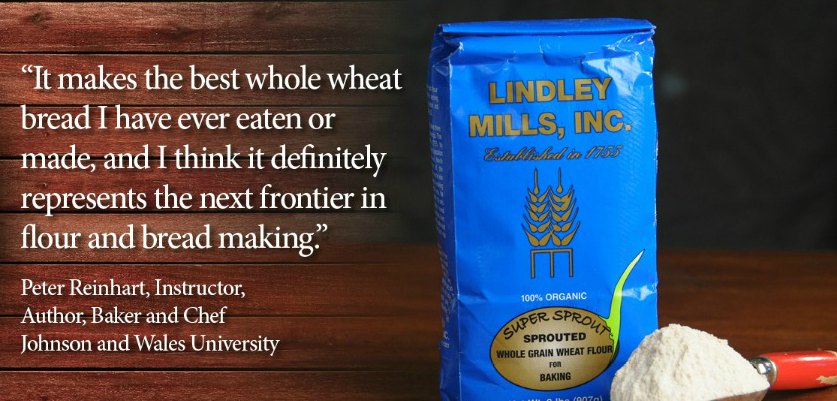
Super Sprout™ is a unique optimally-sprouted whole grain wheat flour for baking. Super Sprout™ consists exclusively and entirely of the intact source whole grain wheat, and is derived solely from clean, sound, post-harvest wheat and potable water. We sprout and mill the wheat into a silky-fine, shelf-stable sprouted whole grain wheat flour with enhanced nutrition, and a well-rounded clean wheat taste. Super Sprout™ differs from refined white and whole wheat flours through its deeper, smoother flavor, higher water absorption, tender longer-lasting softness, and enhanced nutrition.
Super Sprout™ Ingredients
100% Organic Whole Wheat and Water
Benefits of Super Sprout™
Sprouting greatly enhances the nutrition and digestibility of wheat. The body handles sprouted wheat similarly to the way it would intake and digest a vegetable. Our unique, proprietary process for sprouting Super Sprout™ jump-starts digestion and provides a far superior nutritional value for your body compared to other flours, making it a preferred option for health-conscious home and artisan bakers, including individuals with non-celiac gluten sensitivity, diabetes, and gastrointestinal issues.
Revolutionary Super Sprout™
"Wheat provides one fifth of the world’s food calories. From the beginning, when man learned he could store wheat at harvest and have a reliable source of food year-round, that’s what he has done. Through the development of refined white flour to the current push for whole grains and bio-engineered wheat, all flour is from the dormant “stored” wheat seed. Super Sprout™ sprouted whole grain wheat flour is revolutionary because it is the “live” viable wheat seed, stabilized and milled into a bakeable, flavorful, nutritionally enhanced whole grain. In my opinion, one of the next branches in the evolution of wheat as a food source is to utilize the more complete nutritional potential of wheat by letting it fulfill its true destiny and sprout."
—Joe Lindley, President of Lindley Mills, Inc.
Submit a Review
The Battle of Lindley's Mill on September 13, 1781 was the largest engagement of North Carolina's so-called Tory War, a prolonged civil conflict following Lord Charles Cornwallis' invasion of the state during the American Revolution. After Loyalist David Fanning's surprising victory on September 1 over superior forces at Bettis's Bridge, the Loyalists were encouraged to rally in large numbers. Fanning, a leader of the Loyalist militia, had received approval from Maj. James H. Craig, the British commander at Wilmington, for a raid on the state capital, then located in Hillsborough.
Fanning rendezvoused the troops, a total of 1,200 men. The Whigs were led to believe that the Loyalists would attack Gen. John Butler's militia camp on Deep River. Instead, Fanning's army was able to enter Hillsborough undetected in the foggy dawn of September 12. They quickly secured the town, capturing over 200 prisoners including Governor Thomas Burke. While plundering the town, Fanning's men opened its liquor stores and left around noon in a somewhat unruly column, bound for Wilmington via the Cape Fear road.
Receiving news of the disaster at Hillsborough, Butler rode immediately to intercept the Loyalist force where the Wilmington road crossed Cane Creek at the ford at Lindley's Mill in present day southern Alamance County. On a plateau overlooking Stafford's Branch, Butler and Col. Robert Mebane laid an ambush to stop the Loyalists and possibly recover the prisoners.
On the morning of September 13, as the unsuspecting vanguard of struggling Loyalists crossed the branch, a volley tore into their ranks, instantly killing McNeil and pinning down Capt. Archibald McKay's company of Highlanders. After securing the prisoners in the rear at Spring Friends Meetinghouse, Fanning rode forward to organize a flanking attack on the Whig position. Under assault from both front and rear, the Whigs stubbornly held their ground for several hours but were finally driven from the field. When he was seriously wounded in the arm late in the battle, Fanning gave the command to McDugald, who safely reached Wilmington with the prisoners. The killed and wounded, more than 250 on both sides, were buried and cared for by Quakers in the surrounding community. The hard-fought battle was the bloodiest of the war in North Carolina, with more casualties for the numbers engaged than the Battle of Guilford Courthouse.
The raid on Hillsborough and the subsequent battle proved to be a turning point. The Loyalists expected the Whigs to succumb to this double blow, but the effect was quite the opposite; incensed by the audacity of the raid and the loss of the battle, the Whigs redoubled their efforts to suppress the Loyalists and win the war.
¹References: Lindley S. Butler, ed., The Narrative of Col. David Fanning (1981); Algie I. Newlin, The Battle of Lindley's Mill (1975). Lindley S. Butler.
Powell, William S., ed. Encyclopedia of North Carolina. The University of North Carolina Press, Chapel HIll. Published in association with the University of North Carolina at Chapel Hill Library. 2006, p. 678-679.






 In all parts of the world, and especially in developing countries, plant-based foods are the main dietary staple. However, these plant-based diets often have deficits of certain micronutrients like Calcium, Iron, and Zinc.
In all parts of the world, and especially in developing countries, plant-based foods are the main dietary staple. However, these plant-based diets often have deficits of certain micronutrients like Calcium, Iron, and Zinc. 

